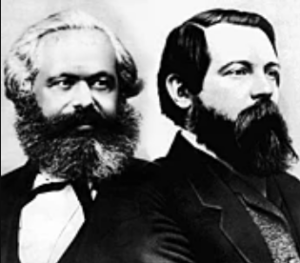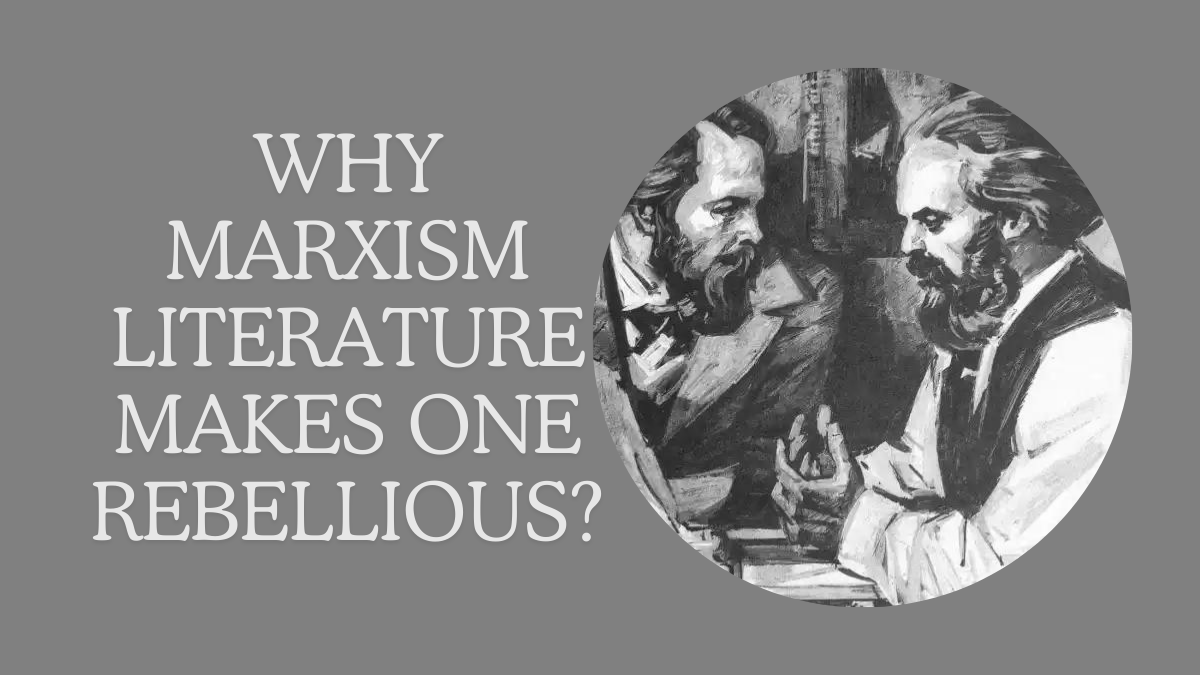Marxism Literature Makes One Rebellious is a widely believed notion, though is that really true? and if it is why is that the case? Read this fascinating piece of article, for if you want to know more about it, there is no better place!
Marxist literature is a term used to describe a body of work that examines literary texts through the lens of socialist and dialectic theories. It delves into the socioeconomic and political aspects that influence the interpretation and structure of texts. This approach to literature scrutinizes the portrayal or challenge of class divisions, class conflicts, and suppression in literary and cultural texts.

Raymond Henry Williams’Williams’ “Marxism and Literature” is a seminal work in this field. Williams introduces his theory of cultural materialism, which he believes is integral to Marxist thought. He argues that Marxism has overlooked the importance of language, and Marxists must seize this missed opportunity to reimagine language.
He elucidates how meanings are attributed to words and signs through cultural usage and social interactions.
In essence, Marxist theory is often seen as an “economic” method of interpreting literary texts. Marxist theorists tend to critically analyze literary texts in light of their economic, ideological, and social contexts, implications, and propositions.
Unpacking the Rebellion in Marxist Literature
The word “rebellious” describes a condition or behavior that indicates a willingness to resist authority, control, or tradition. It can also denote participation in confrontation or armed resistance against an existing government or leader. Essentially, if an individual or a group is characterized as rebellious, they are seen as challenging to control and do not conform to expected behaviors.
When applied to Marxist literature, “rebellious” has a significant meaning. Marxist literature underscores the hardships and injustices the proletariat (working class) endured within capitalist structures. It prompts readers to scrutinize and contest these systems, potentially nurturing a rebellious spirit against perceived injustices.
This rebelliousness is not about inciting disorder or chaos but rather about stimulating critical thinking and a longing for social justice and transformation. In this context, the rebellious nature instigated by Marxist literature is about challenging authority and tradition, aligning closely with the definition of “rebellious.”
The Core of Marxist Literature:
Marxist literature, deeply rooted in Karl Marx’s theories, often stirs up a sense of rebellion as it critically dissects and questions society’s socioeconomic structures.

It highlights the class conflict, the socioeconomic standing of individuals, and the power dynamics among various societal segments.
Class Struggle and Proletarian Revolution:
The central idea of Marxist literature is that the friction between different societal classes propels societal transformation. It argues that capitalism, as an economic framework, exploits and suppresses the proletariat (working class), thereby creating conditions conducive to an inevitable proletarian revolution.
This viewpoint can lead readers to question the status quo, potentially nurturing a rebellious spirit against perceived injustices.
Beyond Sociology of Literature:
Moreover, Marxist literary criticism transcends being just a ”sociology of literature”. It aims to provide a more comprehensive understanding of an academic work, which involves sensitive attention to its forms, styles, and meanings.
However, it also involves understanding these forms, styles, and meanings as products of a specific historical context. This historical and societal context further highlights the disparities and injustices present in society, potentially inciting a desire for change.
The Rebellious Spirit:
Exposure to Marxist literature can lead to a heightened awareness of societal inequalities and class struggles. This awareness can, in turn, foster a rebellious spirit against the existing socioeconomic structures. It’s important to note that the term ”rebellious” in this context doesn’t necessarily imply violent or disruptive actions. Instead, it refers to a mindset that questions and challenges established norms and systems.
Characters and Empathy:
Furthermore, Marxist literature often portrays characters who are victims of capitalist exploitation, which can evoke empathy in readers and inspire them to challenge the status quo. It also exposes the contradictions inherent in capitalist societies, such as the disparity between the bourgeoisie’s wealth (the capitalist class) and the poverty of the proletariat. This can lead readers to question the fairness and sustainability of such a system.
Class-Conscious Perspective:
Additionally, Marxist literature encourages readers to view society from a class-conscious perspective. It emphasizes that class relations and material conditions shape individual experiences and identities. This perspective can lead readers to recognize the systemic nature of social issues rather than attributing them to personal failings.
This recognition can inspire a desire for collective action and societal change.
Conclusion:
In conclusion, Marxist literature can make one rebellious by illuminating the injustices and contradictions of capitalist societies, fostering class consciousness, and inspiring a desire for social change. It provides a critical lens to view and understand the world, encouraging readers to question, challenge, and ultimately transform the socioeconomic structures that shape their lives.
Here are some of the most influential Marxist literature:
Marxist literature often explores class conflict, economic power, ideological control, false consciousness, revolution and Communism, socioeconomic class divide, and economic determinism. Considering all those elements, here we have some of the most prized works considered Marxist literature.
The Communist Manifesto by Karl Marx and Friedrich Engels:
A seminal work that explores the tenets of Communism was written by Karl Marx and Friedrich Engels called “The Communist Manifesto.” It posits that societal evolution is driven by class conflicts, particularly the exploitation of one class by another.
The book focuses on the struggle between the bourgeoisie, the owners of production means, and the proletariat, the working class. It predicts a proletariat-led revolution that will abolish private property, eradicating class distinctions.
The manifesto is divided into four parts, discussing the theory of history, the relationship between Communists and proletarians, a critique of socialist literature, and the Communists’ stance on other parties.
The Condition of the Working Class in England by Friedrich Engels:
Friedrich Engels offers an insightful look In the book “The Condition of the Working Class in England,” which looks into the life of the industrial working class in Victorian England.
Working in Manchester, Engels witnessed the exploitation of workers by the capitalist class. The book explores the living and working conditions of the proletariat, the impact of immigration on labor, and the bourgeoisie’s role in perpetuating these conditions.
Engels’Engels’ observations served as a call for social change to prevent a worker-led revolution. This influential work significantly impacted Karl Marx, leading to their collaboration on “The Communist Manifesto.”
The German Ideology by Karl Marx and Friedrich Engels:
“The German Ideology” by Marx and Engels critiques the Young Hegelians and introduces a new historical theory based on materialism.
The book, written in 1845 and published in 1932, dissects modern German philosophy, especially the ideas of young Hegelians like Bruno Bauer, Ludwig Feuerbach, and Max Stirner.
Marx and Engels propose their theory of historical materialism, arguing that material conditions shape social life, not ideology. They suggest that changes in economic structures cause shifts in the prevailing ideology. This work offers a glimpse into the development of Marx and Engels’ theories against the intellectual backdrop of their time.
The Long Revolution:
“The Long Revolution” by Raymond Williams is a seminal work that explores the ongoing cultural revolution, which he perceives as occurring concurrently with the democratic and industrial processes.
Published in 1961, the book critically examines modern German philosophy, especially the ideas of the Young Hegelians. It introduces the concept of historical materialism, proposing that material conditions influence social life more than ideology.
Recognized as a foundational text in the cultural analysis of English-speaking societies, the book offers insights into the emergence and establishment of progressive political ideas.
Modern Tragedy:
“Modern Tragedy” by Raymond Williams explores the concepts and ideologies that have shaped the understanding and creation of tragedy. Published in 1966, the book views tragedy not only as a literary tradition but also as the tragedy of modern society, revolution, disorder, and individual experiences.
Williams connects literary study with socioeconomic analysis, tracing the concept of tragedy back to its philosophical and dramatic roots with Aristotle. The book was conceived in response to a specific cultural and political situation, reflecting changes in universities and beyond.
The book addresses a social movement, countering the negative critique of academic and liberal tragic theory with a positive re-evaluation of tragedy as a means of experiencing and managing emotions. Its intended audience is the British New Left.
Drama from Ibsen to Brecht:
“From Ibsen to Brecht” by Raymond Williams is an in-depth exploration of the transformation of dramatic form, tracing its development from the works of Henrik Ibsen to those of Bertolt Brecht.
Williams applies his unique critical perspective to examine global drama, offering deep insights into the role of theatre in society and the dynamics of dramatic language.
This book serves as an essential guide for theatre enthusiasts and literature students, shedding light on the evolution of dramatic form and its societal impact.
The English Novel From Dickens to Lawrence:
“From Dickens to Lawrence: The English Novel” by Raymond Williams is an insightful examination of the English novel from the 1840s onwards, a time of significant societal transformation due to the Industrial Revolution, democratic reform movements, and urbanization.
The book delves into how these dramatic shifts inspired authors of the era to experiment with new narrative styles. The creative brilliance of Dickens, the unique originality of the Brontë sisters, and the emotional vision of George Eliot all played a role in infusing new energy and humanity into the English novel.
Williams traces the evolution of the English novel through the works of Hardy, Gissing, and Wells, culminating in D.H. Lawrence. His analysis offers a profound understanding of the progression of the English book and its societal influence.
The Country and the City:
In “The Country and the City,” Raymond Williams offers a cultural critique, examining the contrasting depictions of rural and urban life in English literature from the 16th century onwards.
Born in a Welsh border village, Williams found that the academic portrayals of rural life he encountered at the University of Cambridge did not match his personal experiences. He delved into this discrepancy and the associated concept of the city, which, in the UK, has always been intertwined with the countryside.
The book challenges the idyllic image of rural life as simple and unspoiled, suggesting that this portrayal is a myth that masks the class conflict and hostility in the countryside since the 16th century.
Conversely, the city is portrayed in English novels as a symbol of capitalist production, labor, and exploitation, serving as the “dark mirror” to the countryside. While the countryside is depicted as Eden, the city emerges as the epicenter of modernity, characterized by isolation and the loss of romanticism.
These books comprehensively understand Marx, Marxism, and their societal influence. They are highly recommended for those interested in Marxist theory.
How Society’s About Marxism Literature Makes One Rebellious
Views on Marxism can differ significantly, influenced by personal beliefs, cultural contexts, and historical experiences. Here are some general perspectives:
- Conflict Theory: Marxism is often seen as a conflict theory in sociology, suggesting that society is divided along class lines. Institutions are believed to primarily serve the interests of the bourgeoisie, the economically powerful class, or the proletariat, the larger working class.
- Vision of Equality: Some individuals see Marxism as a pathway to genuine equality, where all share society’s wealth. Marx envisioned a classless society with equal roles irrespective of gender and ethnicity and devoid of discrimination.
- Capitalism Critique: Many view Marxism as a critique of capitalism, emphasizing its inherent inequalities and the exploitation of the proletariat by the bourgeoisie.
- Concept of Alienation: Individuals living in a capitalist society are not truly free. According to Marx, They are alienated beings, estranged from their world.
These are broad viewpoints and may not represent everyone’s opinion on Marxism. The interpretation and acceptance of Marxist theory can vary significantly among individuals and societies.

